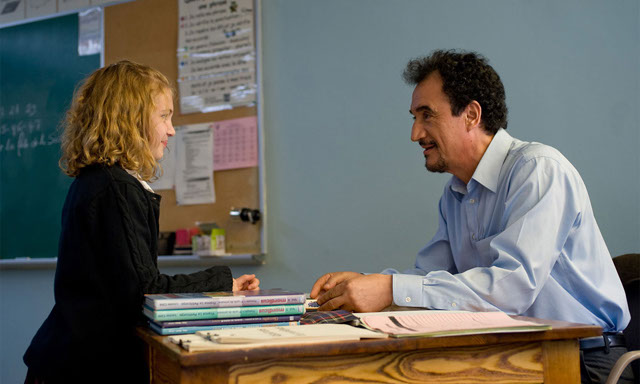
Film: Monsieur Lazhar
Country: Canada
Year of Release: 2012
Director: Philippe Falardeau
Screenwriter: Philippe Falardeau
Starring: Mohamed Fellag, Sophie Nélisse, Émilien Néron
♥♥♥♥
When we watch gritty dramas, we tend to think that we are watching works of realism or naturalism. The truth is, though, that any work of art is constructed and stylised, its creator making a large number of choices between that which is included in a narrative and that which is left out. This happens for many reasons, including the fact that an author or artist wants to make a work engaging to its audience (true realism, some would argue, is usually insufficiently exciting to constitute entertainment) and the fact that by heightening certain aspects of reality beyond the real, we make a work appear more real (Van Gogh’s windswept landscapes create a greater sense of experienced reality than a ‘realist’ depiction of the same landscape). And so what would appear to be a particularly straight-forward concept is very far indeed from simple, a fact to which decades – and in fact millennia – of arts-writing and theoretical musings can attest.
I’m thinking about all of this because Monsieur Lazhar provides what seems to be a remarkably accurate and naturalist account of contemporary reality, taking great care to present the various emotional and actual realities which constitute its narrative. And theoretical meanderings aside, what seems to inform the film’s approach with the greatest intensity is simply its deep and almost profound compassion – for its characters, its narrative and the real world from which its story is gleaned.
One of the finest films I watched at this year’s Durban International Film Festival, where it received its South African premiere, Monsieur Lazhar tells the story of a substitute teacher who arrives at a small Montreal school as a replacement for a teacher who recently hanged herself in her classroom. Based on actual events, the film’s exploration of grief, blame and compassion, is given further depth by the fact that Monsieur Lazhar (Mohamed Fellag) is an Algerian refugee who is quietly haunted by his own inconsolable grief. Featuring superb performances from its ensemble cast, including the school-children, the film is directed with a beautiful but entirely invisible sense of control.
While the film is highly intelligent in its construction of reality, it is also a portrait of a particularly kind of 21st century reality, one in which all parties are given due – but not necessarily equal – consideration. It is effectively a portrait of progressive liberalism and an exploration of its limits. To this end, the film is both highly relevant to the South African reality, or entirely irrelevant, depending on who is watching from where. I can certainly imagine local school-teachers who are working in rural schools without toilets, running water or text-books finding the film’s complex moral quandaries a little rich. But the film makes great attempts at accuracy and inclusion, and in its exploration of who really counts in society, it is universal and perfectly of its time.
Given my introductory thought about realism, it’s interesting that the film brings to mind Lars von Trier’s Dogville, a film that is pretty much its diametric opposite in terms of cinematic technique. Dogville, for the uninitiated, took place on an empty soundstage with a village marked out in chalk, while Monsieur Lazhar provides a perfectly detailed reflection of physical reality. Yet both films are superb ensemble pieces that generate a remarkable feeling of emotional and dramatic truth. Which suggests that it’s not so much how you get there that counts, as where you are going.
I do worry a little that I might have made Monsieur Lazhar appear too high-brow, too self-consciously worthy. But the best thing about the film is its sheer entertainment value. It might well be exploring who we are and where we are standing relative to each other as a global community in the 21st century, but it is also one of the most accessible and entertaining films I’ve watched in years. That the film clings with such compassionate devotion to its divided heart may or may not have something to do with this.
© PETER MACHEN 2017